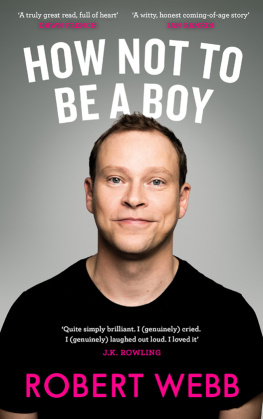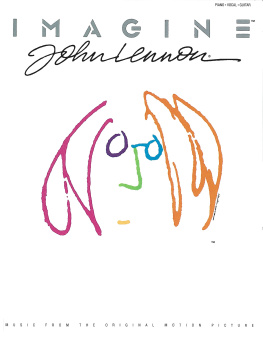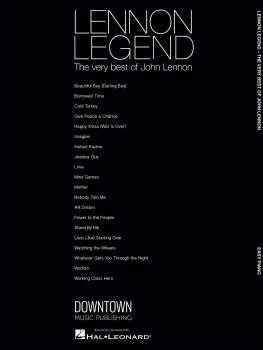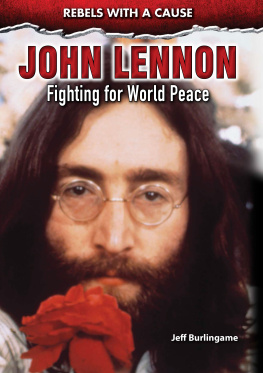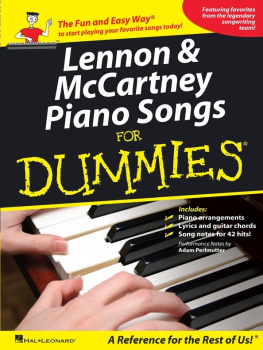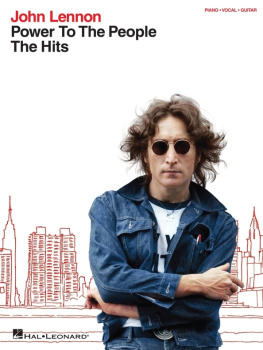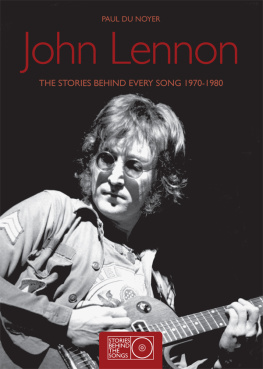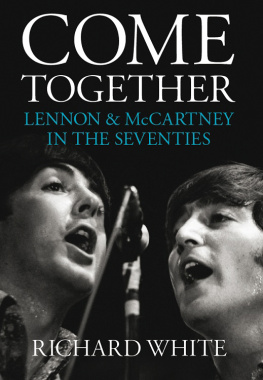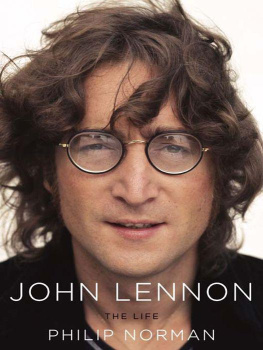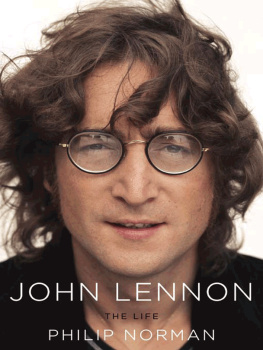The right of Robert Webb to be identified as the Author of this work has been asserted in accordance with the Copyright, Designs and Patents Act 1988.
This ebook is copyright material and must not be copied, reproduced, transferred, distributed, leased, licensed or publicly performed or used in any way except as specifically permitted in writing by the publishers, as allowed under the terms and conditions under which it was purchased or as strictly permitted by applicable copyright law. Any unauthorised distribution or use of this text may be a direct infringement of the authors and publishers rights, and those responsible may be liable in law accordingly.
Introduction A Giant of Popular Music
Life is what happens to you, while youre busy making other plans.
John Lennon
(Beautiful Boy [Darling Boy])
I first became aware of John Lennon when my father brought home a plastic toy guitar. On it were etched the faces and signatures of the four Beatles. They grinned out from behind the multi-coloured nylon strings that soon snapped, rendering it useless as a musical instrument. The cadence of John, Paul, George and Ringo was soon a familiar one to me. It was always John first: he must have been the leader. I was now able to put faces to the records I had heard on the radio, songs that by 1964 were unavoidable to anyone with ears. Id like to say that a John Lennon song was my favourite back then, but actually it was All My Loving, a brisk, walking blues by his bandmate Paul McCartney; the co-written I Want to Hold Your Hand was a close second though.
By the seventies I was old enough to buy my own records and, although to begin with I knew McCartneys output better, thanks to my cousin who bought everything and played it whenever we met, I was increasingly drawn to Lennon as the more controversial, and thus interesting, of the two ex-Beatles. The first of his solo albums I heard was Mind Games, the 1973 release which appeared to promote a conceptual country Lennon called Nutopia. One track was the Nutopian International Anthem: three seconds of silence. That the dead space between tracks could also have titles was at least original. Elsewhere Mind Games was a fine little album, I thought rock at different speeds, as Lennon put it.
The more I listened to Lennon, the more intrigued I was. His music wasnt always great and it varied enormously, from surreal pop, banner-waving anthems and gut-wrenching diatribes, to saccharine love songs and avant-garde. As the seventies unfolded into progressive rock, new wave and electronica, Lennon withdrew into fifties rock n roll.
Still, you knew that whatever form the music came in, Lennon meant it from the heart. So when I awoke on the morning of 9 December 1980 and heard back-to-back John Lennon songs on the radio, one after the other, punctuated by breaking news that he had been murdered in New York by a crazed fan, I was genuinely grief-stricken. Somehow, Lennons assassination meant more than just the passing of a musician, however famous he was. I kept thinking of the W.H. Auden line, written for W.B. Yeats, What instruments we have agree/The day of his death was a dark cold day.
As I discovered more about his backstage life his early days, his time with the Beatles, his later years with (and without) Yoko Ono he became a harder man to like as a person. Behind the scenes Lennon could be a monstrous egoist, cruel and selfish; but he knew this and worked out why, and addressed it as best a man of his generation and upbringing could. And sometimes he got it wrong. Over the years, this process of self-analysis was all too visible and audible. He made sure we were within earshot when he told Yoko, cloyingly so at times, how much he loved her. When he sat in bed with his new wife, naked and angry and in love, demanding that peace be given a chance, he did so with the world watching.
Lennon was one of the giants of the twentieth century. He dazzled us in the sixties and early seventies with brilliant, era-defining songs that will endure long after we are forgotten. He could have left it at that; but he also chose to speak out for what he believed in. He was an idealist and a dreamer who stood by his conviction that the world could and should be a better place. We forget that we only use the phrases all you need is love and give peace a chance because Lennon did.
1
Who am I Supposed to Be? Childhood
I was hip in kindergarten. I was different from others. I was different all my life.
John Lennon
(in Sheff, All We Are Saying, p.156)
John Lennon will forever be associated with the city of Liverpool. It was where he lived for more than half of his relatively short life, where he drew his first breath, took his first steps and where he met his first loves. And the city, in turn, loved him back. In the 1960s, Lennon and the Beatles transformed the bustling, workaday Lancashire port into one of the most famous cities on the planet.
Between the wars Liverpool was thriving. It boasted over 7 miles of docks and a prosperous middle class, comfortable on the profits of maritime trade. The Stanley family lived in one the smartest residential areas, under the shadow of the citys imposing Anglican cathedral.
George Stanley was a sailor turned respectable insurance investigator; his five daughters were anything but conventional. The Stanley sisters grew into a domineering, headstrong quintet. Mary, known to the family as Mimi, was the eldest. Then there was Julia, occasionally known as Judy. She was, according to her daughter Julia Baird, the most unusual and unpredictable of them all, often cast in later histories somewhat inaccurately, as Baird has shown in her own book as a frivolous, flirtatious woman.
It was the musically intrepid Julia who would in later years show her young son his first chords on the guitar. But before that, in 1938, she married a roving seaman, Alfred Lennon, the son of an Irish clerk and one-time music-hall entertainer. That Alf Lennon was immediately unpopular with the Stanley family and none of Julias sisters attended their register office wedding. Alf later claimed they married just for a laugh and that he took his bride to the cinema for their honeymoon. He was a mercurial character, establishing the pattern for the marriage by sailing for the West Indies within a week of the wedding, as a ships steward on board one of the luxury liners that plied the Atlantic.
Julia stayed at home, receiving visits from her husband whenever he was in the country. He was on shore leave at Christmas 1939, when Julia fell pregnant. The couples son was born at around 6.30 p.m. the following 9 October at Oxford Street Maternity Hospital. He was named John after his paternal grandfather. Liverpool, an obvious target for German bombers, had borne the brunt of aerial attacks that week. As a patriotic gesture Julia added a middle name borrowed from Britains redoubtable new prime minister.
John Winston Lennon spent his early years at the Stanley family home in Newcastle Road, at No. 9 (a digit that would recur throughout Lennons life, from the date of his birth to the day he died). The house was not far from the orphanage where Alf himself had grown up. Johns errant father was proving to be as unreliable as the other Stanley sisters feared he would, his frequent maritime jaunts putting further strain on his and Julias stuttering marriage.


